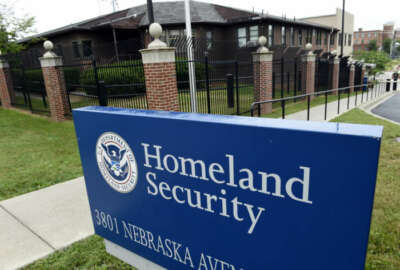Congress is in the beginning stages of tackling a task that hasn’t been done in 15 years: reauthorizing the Homeland Security Department.
In fact, Congress hasn’t done it at all since it created DHS in 2002.
The House Homeland Security Committee passed the DHS Authorization Act in a legislative markup earlier this week.
“It will make DHS more efficient by consolidating and eliminating unnecessary programs and offices,” committee Chairman Mike McCaul (R-Texas) said during the June 14 markup. “This will be made possible by streamlining offices with overlapping duties, cutting unnecessary positions and better outlining respective responsibilities.”
The reauthorization effort has been a long time coming.
The Speaker of the House and the chairmen of eight different committees signed a memorandum of understanding, an official agreement that the committees will reauthorize DHS on a regular basis.
“This is not a one-time deal,” McCaul said. “It is the establishment of a regular process that will ensure robust oversight and improve the operation of the department for the benefit of the American people.”
McCaul and others on his committee see the MOU as an important step forward for the department and its challenges with congressional jurisdiction. Depending on the count, DHS has anywhere from 92 to 108 different congressional committees and subcommittees that have oversight of the department.
The committee has already considered and cleared much of the language in the authorization bill through previous pieces of legislation. Lawmakers have already looked at new acquisition authorities and explored the concept of creating a new cyber agency within DHS.
Congress will have opportunities to add other amendments to the reauthorization bill, but here’s a glimpse of what else is in the legislation.
Clear roles and responsibilities
Most of the bill outlines specific descriptions for each of the top leadership positions within the department. The legislation describes their duties and adds new roles and responsibilities.
For example, the authorization bill specifically makes the chief information officer’s role clear. The CIO serves as the “lead technical authority” for all IT programs within the department and its components and specifically reports to the secretary.
The legislation charges the DHS CIO with developing an IT strategic plan every five years and an inventory of all of the department’s software licenses every two years.
Some positions, such as the shared service director, are eliminated.
The legislation also codifies the chief security officer position, which will be responsible for developing and implementing security standards, programs and policies, providing security training and education to DHS employees and lending support to the department’s components on security questions.
Engagement, training
The legislation also makes “enhancements” to the DHS rotation program. The DHS secretary selects employees to temporarily detail to another office, component or subcomponent within the agency.
The program, the authorization act clarifies, is designed to “foster greater departmental integration and unity of effort” and to “help enhance the knowledge, skills and abilities of participating personnel.”
New language in the legislation clarifies that employees can return to their previously held positions after about a year or get a promotion to a corresponding or higher position.
The bill also authorizes the department to establish a comparable program for employees in DHS’ intelligence enterprise or other areas of the agency that the secretary and chief human capital officer will specify.
An amendment to the authorization act also codifies some of the department’s previous efforts to improve employee engagement. It authorizes an employee engagement steering committee, with DHS stood up a few years ago to address the department’s low employee morale.
Space efficiencies, duplication
Congress also wants the department to review its facilities and the administrative and logistics functions for each DHS component and geographic location.
The review should also provide “specific recommendations and an associated cost-benefit analysis for the consolidation of the facilities and administrative and logistics functions of components of the department within each designated geographic area.”
Specifically, Congress wants DHS to make suggestions about facilities that could get consolidated or closed. The department should also consider whether any of its leases are about to expire, or whether it can consolidate facilities with other federal, state or local offices, warehouses or laboratories.
In addition, the department will be asked to review its research and development functions and submit suggestions to Congress on ways to consolidate and streamline those offices.
Copyright
© 2024 Federal News Network. All rights reserved. This website is not intended for users located within the European Economic Area.
